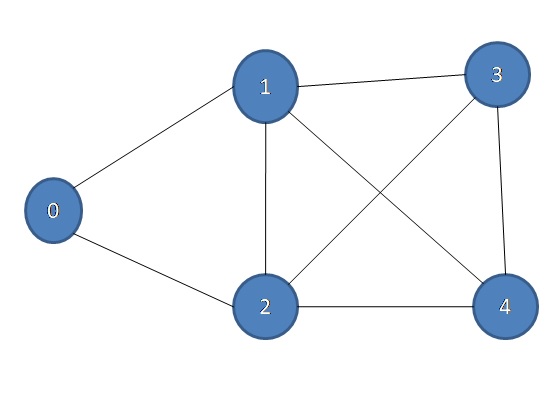Home »
Interview coding problems/challenges
Check a graph is Hamiltonian or not (Hamiltonian path)
Hamiltonian path: In this article, we are going to learn how to check is a graph Hamiltonian or not?
Submitted by Souvik Saha, on May 11, 2019
Problem statement
Given a graph G. you have to find out that that graph is Hamiltonian or not.
Example:
Input:

Output: 1
Because here is a path 0 → 1 → 5 → 3 → 2 → 0 and 0 → 2 → 3 → 5 → 1 → 0
Algorithm:
To solve this problem we follow this approach:
- We take the source vertex and go for its adjacent not visited vertices.
- Whenever we find a new vertex we make it source vertex and we repeat step 1.
- When a vertex count is equal to the vertex number then we check that from vertex is there any path to the source vertex. If there is exist a path to the source vertex then we will mark it and if not then make that vertex as unmarked and continue the process.
- If there is no such path then we say NO.
C++ Implementation to check a graph is Hamiltonian or not
#include <iostream>
#include <bits/stdc++.h>
using namespace std;
void addedge(list<int>* g, int u, int v)
{
g[u].push_back(v);
g[v].push_back(u);
}
int hamiltonian(list<int>* g, int v, int s, int& count, bool* vis, int& h)
{
if (count > 1 && s == 0) {
h = 1;
return 1;
}
list<int>::iterator it;
for (it = g[s].begin(); it != g[s].end(); it++) {
if (!vis[*it]) {
vis[*it] = true;
count++;
if (count == v) {
vis[0] = false;
}
hamiltonian(g, v, *it, count, vis, h);
vis[0] = true;
vis[*it] = false;
count--;
}
}
return 0;
}
int main()
{
int num;
cin >> num;
for (int i = 0; i < num; i++) {
int v, e;
cin >> v >> e;
list<int> g[v];
int x, y;
for (int j = 0; j < e; j++) {
cin >> x >> y;
addedge(g, x, y);
}
bool vis[v];
memset(vis, false, sizeof(vis));
int count = 1;
vis[0] = true;
int h = 0;
hamiltonian(g, v, 0, count, vis, h);
cout << h << endl;
}
return 0;
}
Output
1
5
8
0 1
0 2
1 2
1 3
1 4
3 4
3 2
2 4
1
Advertisement
Advertisement